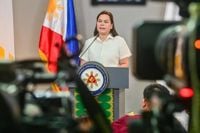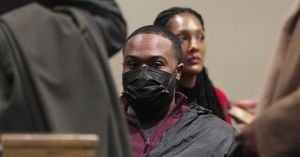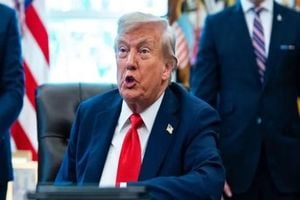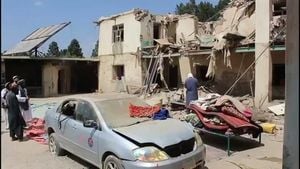For the first time since their father’s arrest, all four children of former Philippine President Rodrigo Duterte gathered at the International Criminal Court (ICC) detention center in The Hague, Netherlands, on Wednesday, August 27, 2025. The visit, which came at the express request of the former president himself, offered a rare and poignant family reunion within the walls of an institution now central to one of the Philippines’ most controversial chapters.
According to Inquirer, Vice President Sara Duterte, Davao City Vice Mayor Sebastian Duterte, Davao City Representative Paolo Duterte, and Veronica “Kitty” Duterte made the journey together to see their father, who has been held at the ICC since March 11, 2025. The visit was notable not just for its symbolism—four siblings united in support of their embattled father—but also for the emotional resonance it carried for the Duterte family.
“He was happy,” Sara Duterte told reporters in Manila, relaying her father’s reaction to their joint visit. “It was somehow loud since there were four of us. At one point, Baste [Sebastian Duterte] was saying that he would not speak anymore since no one was listening. So, maybe he [Rodrigo] missed that kind of discussion where everyone was speaking all at once and we are all happy that all four of us visited him.”
The siblings’ reunion at the ICC detention center was not a spur-of-the-moment affair. Sara explained that it was last month when their father told Veronica that he wanted to personally talk to all four of his children—an unusual request, given the strict visitation limits imposed by the court. Fortunately, the ICC made an exception, allowing all four siblings to visit at the same time, a gesture that did not go unappreciated by the Duterte family.
When pressed about the substance of their conversation, Sara Duterte was quick to clarify that politics—and particularly the much-speculated 2028 presidential election—was not on the agenda. “Nothing about the future. No concrete plans [for] the future. But we discussed what’s happening now and what could possibly happen tomorrow or three years from now,” she said, according to the Inquirer. She emphasized that the discussion centered around their personal lives, rather than national affairs or political strategy.
There were lighter moments, too, but the visit was not without its worries. During their time together, Paolo Duterte massaged his father’s neck, arms, and feet for about an hour and a half. It was then that the siblings noticed one of Rodrigo Duterte’s feet had turned “ashen gray.” While the former president reportedly appeared “okay,” the discoloration was a cause for concern. The family was also cautioned by one of Duterte’s nurses not to bring him snacks from the vending machine, as his blood sugar level had spiked. Instead, he was permitted only a sugar-free soda.
“They told us not to buy snacks since his [blood] sugar level was high at that time. They want to lower his sugar level as soon as possible,” Sara recounted. She added, “What we were also told is that they were monitoring his food intake because his blood sugar spiked, so we can’t share any snacks with him.”
Despite the somber circumstances, there were moments of pride and familial warmth. Sara shared that Rodrigo Duterte was “extremely proud” of her following the Senate’s decision to archive the impeachment case against her, which came after a Supreme Court ruling deemed the complaint unconstitutional. “We didn’t get to talk about the dismissal of the impeachment case. I think that was when Kitty visited, and she was the one who gave the news to President Duterte. That was what he told Veronica; he said he was extremely proud,” Sara said.
This visit marked Sara Duterte’s fourth trip to the Netherlands in 2025 since her father’s detention. The Vice President’s frequent international travel, including stops to meet Filipino communities and advocate for her father’s situation, has drawn criticism back home, even from Malacañang. However, her office maintains that she continues to fulfill her duties, whether in person or virtually. “Sometimes virtual, sometimes ghost,” her team has said, perhaps a nod to the unpredictable demands of both family and public service.
The arrest of Rodrigo Duterte on March 11, 2025, and his subsequent transfer to The Hague to stand trial before the ICC, marked a dramatic turn in the saga of the former president, whose controversial war on drugs resulted in thousands of deaths. The ICC’s involvement has polarized public opinion in the Philippines, with supporters insisting on his innocence and critics demanding accountability for human rights abuses.
For the Duterte family, the visit was a chance to reconnect, if only briefly, in a setting far from home and under the shadow of legal proceedings. Sara Duterte was candid when asked about her feelings seeing all four siblings together: “I don’t have feelings [on that]. None. I have not thought about it.” Yet, she acknowledged the importance of honoring their father’s wishes. “But for me, if that’s what makes him [father] happy, we will do it. He requested that he wants to see all of us personally, so we gave that to him.”
While the public and political speculation swirl around Sara Duterte’s future—especially regarding a potential 2028 presidential run—she made it clear that their family discussions remain focused on the present. The siblings’ willingness to set aside political ambitions, at least for now, underscores the personal toll that public life and high-profile legal battles can exact on even the most prominent families.
Meanwhile, Sara Duterte’s schedule remains packed. According to ABS-CBN, she is set to attend an Overseas Filipino Worker (OFW) event in Japan just days before her father’s next ICC hearing. This international engagement, coming so soon after her visit to The Hague, highlights the balancing act she faces—juggling family responsibilities, political duties, and the ongoing scrutiny of her father’s case.
As the Duterte family navigates these turbulent times, the ICC’s proceedings continue to draw attention both domestically and internationally. The outcome of the case will likely have far-reaching implications for the Philippines’ approach to justice, accountability, and the rule of law. For now, though, the image of four siblings gathered in a foreign land, united by family ties and a father’s simple request, stands as a powerful reminder of the human stories behind the headlines.
In a world where politics and family are often intertwined, the Duterte siblings’ visit to The Hague offered a rare glimpse of unity amid uncertainty—a moment that, for now, belongs to them alone.




